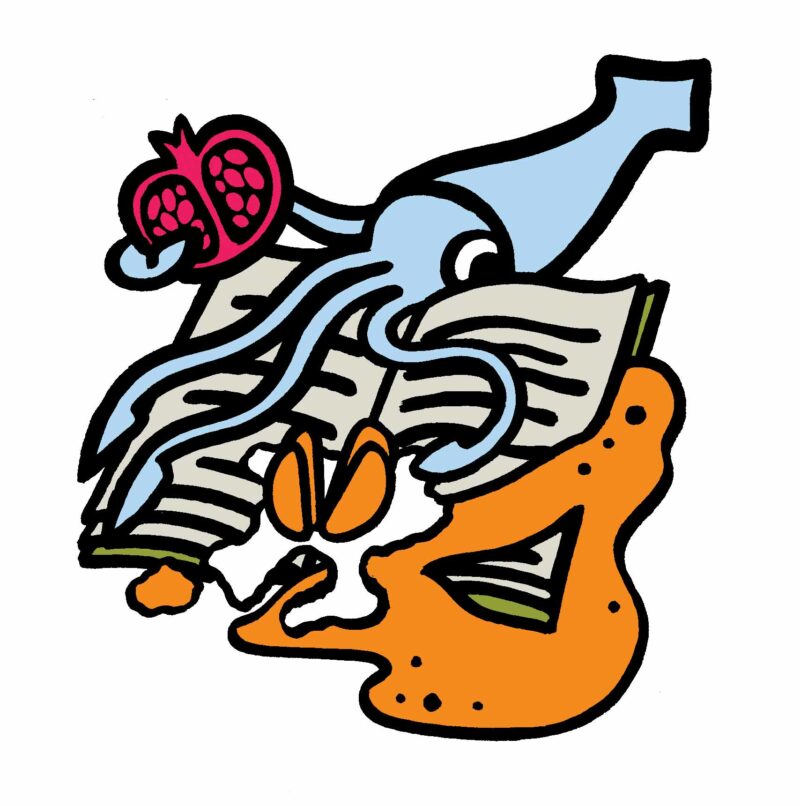Within the two hundred–odd pages of the novel Antiquity, written by Hanna Johansson and translated from the Swedish by Kira Josefsson, variants of the word lonely appear sixty-three times. Yet despite its pervasive loneliness, the book is heavily populated with characters. It follows an unnamed journalist as she travels to the Greek vacation home of an older, established, and self-obsessed artist, Helena, whom she once interviewed for a magazine. They are joined in Greece by Helena’s brooding and buzz-cut teenage daughter, Olga. Tonally similar to Katie Kitamura’s Intimacies, the novel features a narrator in a foreign land, steeped more in thought than in action. Mostly, Helena, Olga, and the unnamed narrator consume: hand-picked pomegranates, fresh squid, fragrant oranges, coffee. They take walks. They lie on the beach. Each page could be a still shot, capturing the precise mood of each “memory tableaux,” as the narrator puts it, memorializing one exquisitely rendered moment after another.
Antiquity is crowded with loneliness. The narrator’s loneliness is indiscriminate. It creeps up on her in the middle of watching a dance recital, while at dinner with others, in the midst of a commute. Readers quickly realize that this loneliness is of the narrator’s own making. She constantly calculates the distance between herself and others, and she is paralyzed by her desire for an idealized closeness—with Helena, previous partners, and eventually Olga. In the narrator’s hands, nearness is a function of both alienation and intimacy. She’s around others, and observes them deeply, but still feels alone and unseen. While listening to the banalities of Helena’s day, the narrator calls herself “an attentive rock.”
About two-thirds of the way through the book, the narrator’s desire for closeness shifts from Helena to Olga, and the two become romantically involved. The book’s similarities to Vladimir Nabokov’s Lolita are clear: an adult who projects their fantasies of selfhood onto a child. The narrator uses the predatory language of Olga being “special.” Predictably, the roles between lover and parent collapse. “I became her mother that night,” the narrator recalls of one of her and Olga’s clandestine encounters. “I rocked her. I nursed her.” Like Dolores Haze, Olga is merely a thing, a beautiful statue with a “closed-eyed marble face.” Thinking of Olga makes the narrator think of herself, a relationality that is actually a kind of individualism. “When I looked at her it was as if I saw myself,” the narrator says. “When I kissed her I liberated her from something: her childhood, her mother.”
Unlike the narrator, however, Olga is comfortable without anyone. “I don’t want any friends,” Olga says. In Olga’s hands, aloneness becomes something to covet. Throughout the book, Johansson renders a genealogy of desire, placing intimacies side by side for the reader and the narrator to examine. A metaphor for this strategy comes from the sky: “I read: Orion is one of few constellations where many of the stars are actually near each other in space.” Near but rarely touching: this is how the narrator lives her life, until a spark between her and Olga begins to grow.
As the summer wanes, the narrator increasingly concerns herself with the fantasy of her own impact. In other words, who will she be to Olga in the future? “She would keep living; I would have nothing to grieve,” the narrator assesses. Again the narrator measures the weight that she and Olga will have on each other as if marking a doorway with each person’s height. Ultimately, Antiquity maps out the crystallizing process of an impression, the places in a temporary affair where the fleshy stuff of love or lust hardens into narrative. “I was no longer in my own body,” the narrator says as she is about to depart from Olga and Helena. “I was in the story I was telling myself. I was preparing a memory for later.”
Publisher: Catapult Page count: 224 Price: $26.00 Key quote: “I burned the ground she was walking on, I gave her an indelible memory, I erected a border, there would be no way back. I tore a hole in her history.” Shelve next to: Julia May Jonas, Olivia Sudjic Unscientifically calculated reading time: Seven cherry Popsicles





